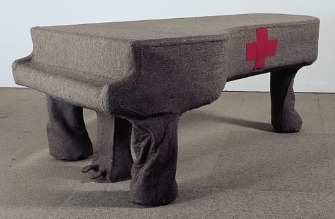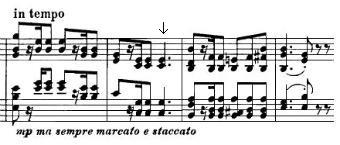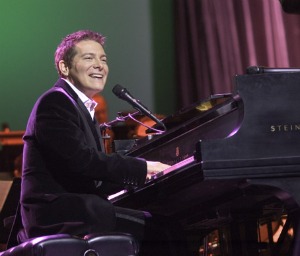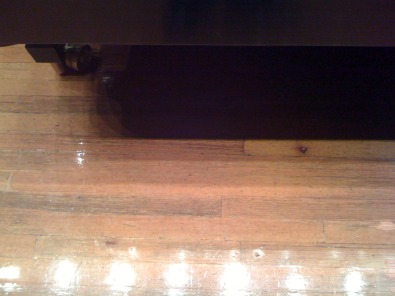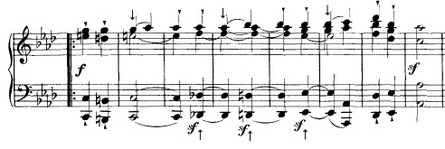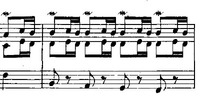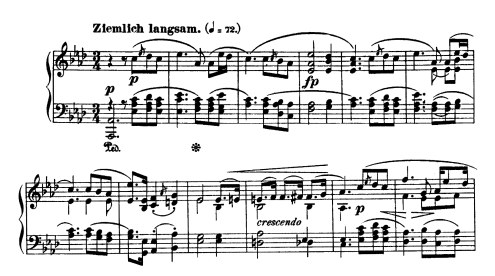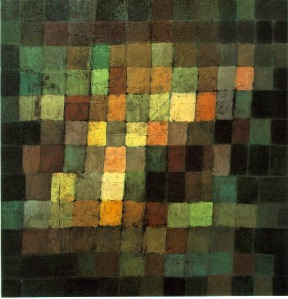A distinguishing trait of Mozart's music is rapidly and frequently changing character, Affekt, or mood. He's a quick change artist. For the 21st-century listener, it's simplistic to hear only a single unvarying Affekt or character in an entire movement of old music. We tend to hear the changes. Mozart's music may offer an extreme, an almost constantly shifting and evolving rendering of human state-of-mind. It's classical-sonata … [Read more...]
Archives for 2011
Padded
Piano keys are made of wood that's weighted with metal, and faced with plastic in place of what used to be ivory. They are levers. How exactly a musician touches these sticks may or may not alter the physical sound the piano makes. The cultivation of legato -- the binding together of successive tones produced with flexible wrist -- is an important aspect of classical piano training. Some of us wonder about the science of legato, of what we … [Read more...]
Repetition is a Form of Flattery
Liking the smoked bluefish salad I had at an organically-sourced Brooklyn eatery, I made something like it at home. In preparation for shooting a video last week, I practiced again a piece that I practiced last year for summer concerts, and two years before that to play in Michigan, and thirteen years earlier still... Passing by a store on Broadway that had four identical (mass-produced) lamps hanging in a row, I was prompted to tweet this … [Read more...]
Preparedness
A part of preparing to perform music is a psychic readying -- we need to be prepared to accept very fine results. Perhaps this seems strange, since so much practicing of classical music focuses on avoiding mistakes? Our practice can prepare us to receive. Any sense that we don't deserve or are not entitled to extraordinary music making can impede it. Especially if time is short or preparation is scant, we may play less well than possible … [Read more...]
Stay Down
Playing for me in a recent masterclass, a pianist performed Liszt's etude "Wild Hunt." At the end of two measures of melody (m. 60), he raised his wrists immediately after playing the last note in the bar, releasing his fingers from the keys -- although the notated duration of this sound is the longest in the line. The piano is a device that never came with a set of instructions. In a sense, musicians are always making how-to guides. And … [Read more...]
Piano Vocal
Preparing the month of shows I'm hosting on Q2 -- sent me into a studio for several hours of recording voice tracks, my commentary. I was wearing headphones so the microphone-heard sound of my own talking was in my ear. It made me wonder all over again: Do the sounds a pianist makes from the piano have any relation to that person's physical voice? For me it's concerning if a musician has a particularly harsh or unmodulated speaking voice. One … [Read more...]
Term Limits
Five recent Tweets of mine -- please pardon the cross-platform redundancy. April 21, 2011 In a way our technology is putting sound and music back together -- as perhaps the technology of writing took music and sound apart. April 20, 2011 Yes, some of Rachmaninoff's music is very much part of the "Back to Bach" movement. April 20, 2011 It's not surprising composers borrow or steal so much -- if you consider that we are all just adding … [Read more...]
Voice Mis-Leading
Some solo piano music has part-writing that seems to correspond directly to music for string quartet. In such keyboard music, there are a constant number of "voices" tracing coherent individual lines. Beethoven: Opus 110 These voice-parts have integrity. We can follow tenor or bass, alto or soprano (viola or cello, second violin or first violin). This is a modern practice in keyboard music, I believe. The earliest keyboard pieces -- … [Read more...]
Nothing ventured, nothing lost
Can it be that aspiring musicians do not enter competitions because they don't want to lose? It might make sense. Or it may be an easy way out. I'm surprised by the competition-reticence of some young pianists. Not suffering disappointment in competitions may keep an artist's work and motivation pure. Not being known to have lost competitions may be useful professionally. Or, lacking the severe scrutiny of the competition platform, a player's … [Read more...]
Thinner Air, Up There
In many a notated German Dance or Ländler (or in its second part), there are rocking passages in regular eighth-notes featuring the interval of the sixth. On the violin, such lines can involve back and forth string-crossing, bariolage. Often a low pitch in the passage (open string) remains constant. Such music resembles and may signify yodeling. Making music across the voice break is a recurring feature of instrumental music by Schubert, and … [Read more...]
To the left
There was a nail in the old Carnegie Hall stage floor that marked the precise spot where the leg of Vladimir Horowitz's piano was to be positioned. Neurosis? Or careful attention to sonic detail? I was not very satisfied with the way I was playing -- near the end of a three-hour rehearsal at Wigmore Hall in London. My friend David Rick suggested that the piano be moved back, much closer to the rear wall of the Wigmore stage. The move was made … [Read more...]
Pat head, rub tummy
Within solo piano music, it happens that the individual must play two very differing things at the same time. In Beethoven's Opus 110, the right and left hands have different patterns of articulation and emphasis. For me, it would be best if the heavy, syncopated comic accents in the left-hand music do not in any way affect the folk simplicity of the paired-note articulation above, in the highest voice in the right hand part. In doing these … [Read more...]
Departure
In J. S. Bach's Capriccio, BWV 992 I noticed strongly emotional content in an unusually repetitious passage -- a place where as the keyboardist's right hand stays in place repeating a simple figure the left hand incrementally departs physically, signifying departure, descending step by step lower and lower. Something similar occurs in Schubert's G-flat-Major Impromptu: … [Read more...]
Texts for the Memory
Repurposing of musical passages -- especially repeating a passage modified with a different continuation -- was useful efficiency in the writing of music to be read by amateurs in the living room. Those same ways of constructing phrases pose memory puzzles for the professional player delivering the music in a public concert. Scripts of old plays were memorized by actors, making use of all the considerable techniques of the memory arts of the … [Read more...]
What if?
What if our classical music is really much more varied, confusing, and more disorderly than we make it sound in playing today? What if the wordless instrumental music of Mozart and Beethoven encodes and encloses so many references to the specifics and generalities of living Italian comic opera that we're in the dark without it? What if in the great regularizing of the bow, the beat, subdivisions, fingerings, registers high and low, we … [Read more...]


